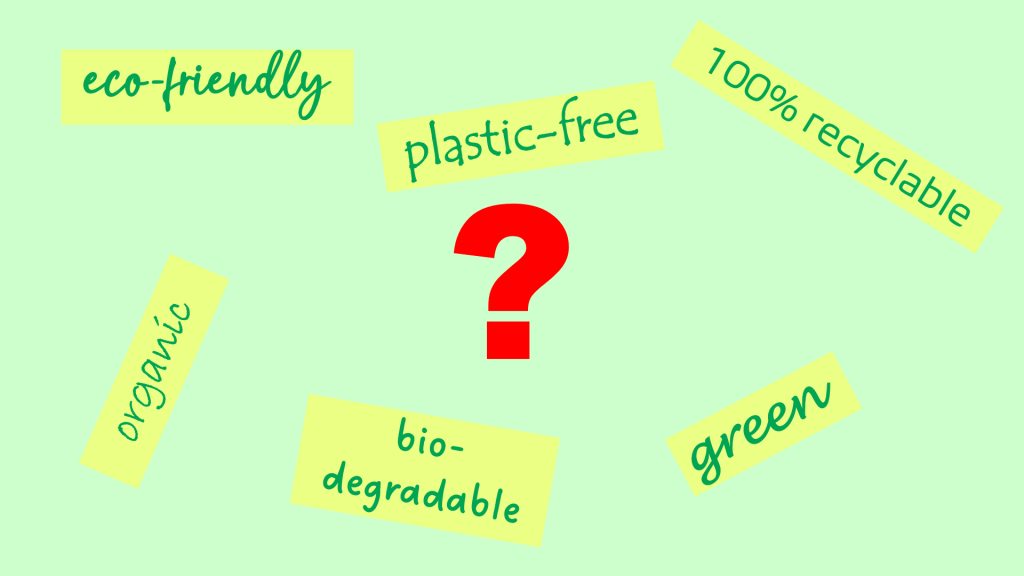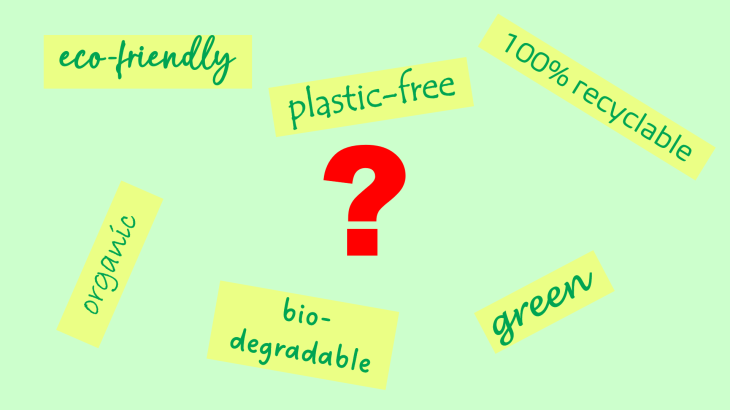Greenwashing: a trending ‘sustainable marketing strategy’

Illustration by Haorui Luo
In these past decades, ‘Sustainability’ has grown from just a buzzword to a lifestyle trend and even a necessity in the recent years. Increasing number of people are now becoming aware of the impact that they have on the environment. Consumers too have started choosing products that are more environmentally ‘sustainable’.
A survey conducted by the multinational auditing firm KPMG in the Netherlands, Me, My Life and Wallet, concluded that 80% of their 30,000 respondents cared about sustainability while making consumer choices. More than 50% of them, became more concerned about the environment after the COVID-19 pandemic. This increasing trend, however, has unfortunately encouraged many companies to use a misleading marketing strategy – Greenwashing – to improve the public image of their brands.
What is Greenwashing?
Greenwashing is a type of advertising in which companies or brands falsely claim that their products are more ‘sustainable’ without providing significant evidence to support the claim. Often, this kind of advertising is a cover for their unsustainable production ways or just a marketing strategy to increase their revenue. A screening conducted by the European Union and national consumer authorities for greenwashing in 2021 showed that 40% of the brands they screened, were either deceptive or falsely exaggerated that their products are sustainable.
In mid-2000s, Volkswagen, an automobile giant, advertised that they had installed devices and software in their cars that reduced its tailgate emissions. However, it was later discovered in 2015, that this software was only activated during the laboratory emissions testing, while in reality, their cars released 40 times more NOx on the streets than the US national limits. After this was exposed, Volkswagen lost billions of USD in legal fines and settlements, and many of its top management members (including its CEO) resigned or were suspended, making it one of the biggest greenwashing scandals of the century.
How do brands ‘greenwash’ their consumers?
There are multiple ways brands can greenwash their consumers. Many brands use trending labels like ‘green’ or ‘eco-friendly’ to market their products, which have very vague definitions. Such labels may not directly mean that their products are sustainable, and thus have plenty of room for misinterpretation. Some brands even use nature imagery or official looking logos to make buyers think that their products are more sustainable or eco-friendly, while lacking proper evidence to prove it.
Sometimes, companies may claim that their products are made from recycled material or from sustainably sourced material, when in reality, it may not be true. Some may advertise that a minor change that they made in their products can substantially reduce a negative impact on the environment, without basing it on any solid evidence. Certain brands are also known to disproportionately highlight the environmentally positive effects of their products while distracting consumers away from other significant negative impacts that their products have on the environment. One such example was McDonald’s – known for campaigning their paper-based straws as ‘plastic-free’, which were in fact, made from a material that was not recyclable.
This type of advertising can be illusionary, leading consumers to make choices which are not truly sustainable. Such deceptions undermine the global efforts to reduce emissions and mitigate climate change. It may also incite public mistrust in product sustainability and in the global sustainability efforts in general. Apart from this, these dishonest marketing strategies harm the companies as well. If exposed, they may lose consumer trust and their well-maintained public image, to say nothing of financial losses and the risk of lengthy legal battles.
How do we avoid being ‘greenwashed’?
As a consumer, who want to make sustainable choices to reduce our footprint on the environment, how do we know if we’re being ‘greenwashed’ or the claims of sustainability that certain brands are making are really true? Here are some tips that can help you, as a consumer, to make sustainable choices.
- First of all, it’s important to always look for evidence before being carried away by any ‘green’ labels. Do not believe in vague labels like ‘eco-friendly’, ‘bio-degradable’, etc. when it is not supplemented by proper proof.
- Look for third party certifications. Some organizations offer third party sustainability certificates for different products. These certifications assure the sustainability of raw material procurement process of the product (e.g., Forest Stewardship Council certification), or the manufacturing process of the product (e.g., Global Organic Textile Standards certification), or even the whole life cycle of the product (e.g., Cradle-to-Cradle certification). Some of them have strict sustainability standards to be met to obtain the certificate. Such certifications provide a regulatory definition for product sustainability.
- Pause and think about the life cycle of the product you are buying. Is it reusable? Is it made of recyclable material? Rationally thinking about these things can help you make a sustainable choice.
- Researching the brands thoroughly about their actions and impacts also helps in spotting truly sustainable brands. In most parts of the world, large publicly listed companies are required to report their impacts on the environment and the sustainability of their business. Some of these reports have third party assurances from auditing firms. Such reports are always reliable in terms of sustainability.
As we are now faring dangerously close to the tipping point temperature of global warming, it is becoming increasingly important for the entire population of the world to shift to a sustainable lifestyle. Choosing sustainable products as a consumer is a key part of this lifestyle change.
While most companies recognize this consumer shift, some use this market opportunity for their own benefit, by greenwashing – a strategy to market their products as sustainable. While governments, consumer authorities and other organizations are working hard to regularize this, it is still important to be vigilant while buying products. These efforts, even seemingly trivial, when done by a collective population, can make a huge contribution to the global sustainability efforts.
Written by Saee Ghule
Edited by Haorui Luo
References:
- “What Is Greenwashing?,” March 26, 2024. https://www.nrdc.org/stories/what-greenwashing.
- Am, Jordan Bar, Vinit Doshi, Steve Noble, and Anandi Malik. “Consumers Care about Sustainability—and Back It up with Their Wallets.” McKinsey & Company, February 6, 2023. https://www.mckinsey.com/industries/consumer-packaged-goods/our-insights/consumers-care-about-sustainability-and-back-it-up-with-their-wallets.
- Christian, Kayti. “Sustainability Certifications: What Do They Actually Mean? – The Good Trade.” The Good Trade, November 29, 2023. https://www.thegoodtrade.com/features/sustainable-certifications-and-standards/.
- Eco Warrior. “5 Ways You Can Avoid Greenwashing as an Eco-Conscious Consumer.” The Eco Warrior, May 10, 2023. https://theecowarrior.eco/5-ways-you-can-avoid-greenwashing-as-an-eco-conscious-consumer/.
- Edwards, Carlyann. “What Is Greenwashing?” Business News Daily, January 12, 2024. https://www.businessnewsdaily.com/10946-greenwashing.html.
- Groves, Jo. “What Is Greenwashing?” Forbes Advisor UK, July 4, 2022. https://www.forbes.com/uk/advisor/investing/what-is-greenwashing/.
- Koskela, Anna. “9 Negative Effects Greenwashing Has on Your Business.” ASKEL, October 13, 2023. https://askelsustainabilitysolutions.com/negative-effects-of-greenwashing-on-business/.
- Molenaars, Edgar. “Dutch People and Sustainable Consumption.” KPMG, August 8, 2023. https://kpmg.com/nl/en/home/insights/2023/08/dutch-sustainable-consumption.html.
- Mooney, Lauren. “What Is Greenwashing and Why Is It Bad News for Sustainability? | Verive.” Verive (blog), February 15, 2024. https://verive.eu/what-is-greenwashing-and-why-is-it-bad-news-for-sustainability/.
- United Nations. “Greenwashing – the Deceptive Tactics behind Environmental Claims | United Nations.” United Nations, n.d. https://www.un.org/en/climatechange/science/climate-issues/greenwashing.
- Wikipedia contributors. “Volkswagen Emissions Scandal.” Wikipedia, April 1, 2024. https://en.wikipedia.org/wiki/Volkswagen_emissions_scandal#Consequences.
